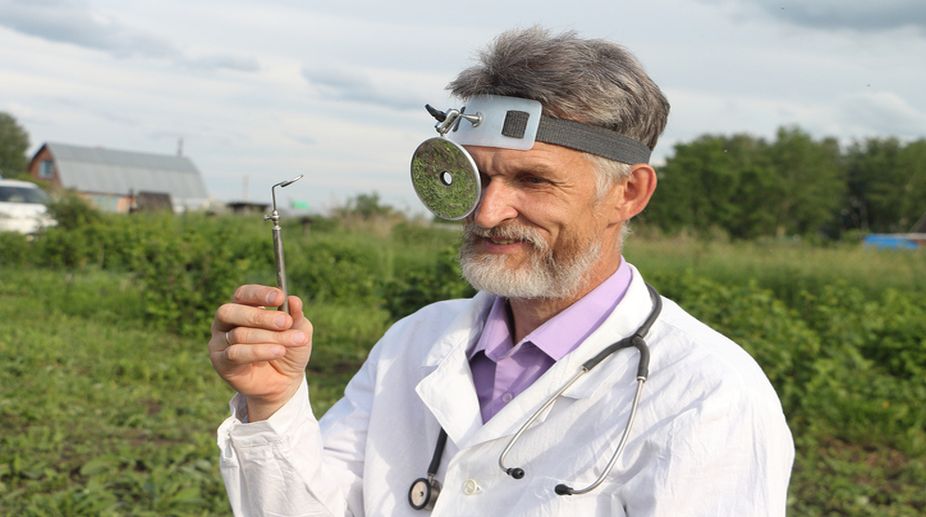Fatima Sana opens up on her Indira Gandhi role in ‘Sam Bahadur’
Fatima Sana Shaikh embraces the challenge of portraying Indira Gandhi in Meghna Gulzar's Sam Bahadur, showcasing a unique and vulnerable perspective.

Representational Image (PHOTO: GETTY IMAGES)
He was the only one who carried on medical practice in our village. He was Dr. H…, a short, stocky man clad in loose khaki trousers, white shirt and black shoes. A brown hat hid his bald pate. He cycled to his chamber every day with his black leather bag hung from the handle. He was different in this respect from the three doctors in adjoining villages who dressed more traditionally and moved around in rickshaws.
A room on the main road made of brick walls and tiled roof served as his chamber. It was divided into two parts by two almirahs with a gap between that served as a passage. A blue curtain hung on the passage to block the view of others. He would sit with the pharmacy at his back on a wooden chair behind a medium-sized table. Facing hi were two benches on which his patients sat. He had two stethoscopes – one with a bell-shaped end and the other with a flat round sensor – and a torch. His medicines came in two forms – powdered and liquid. The powdered ones were put in small white pieces of paper folded from four sides. The liquids, called ‘mixtures’, were delivered in glass bottles of different sizes with marked strips of paper indicating dosages. All bottles bore an instruction to “Shake well before use”. The liquids were generally of two colours, yellow and red from which the villagers ascertained the seriousness of the ailment – red, very critical; yellow, comparatively less!
Advertisement
The doctor was middle-aged with a number of children and a sickly wife. Although a native of the village, he had a rather hazy past since he had lived away for over a decade and a half in his youth. No one really knew when he had studied medicine or where. He claimed to have been a doctor in the Indian Army and that he had seen action in Burma, Egypt and Mesopotamia before taking voluntary retirement.
Advertisement
Others, however, said that he did not even have a LMF degree which was the minimum qualification required to practise medicine in those days. These people said he had joined the army as a male nurse during World War II without finishing school and returned to the village when the nursing unit was disbanded.
The doctor would open his chamber in the morning and stay till mid-day. His patients were hardly many. He would take a short nap after taking his meal and spend time angling in the afternoon. He described it as the English way of life. His love for foreign rulers led him to give English names to his two daughters. But he chose Russian nicknames for his two younger sons – Vikinisky and Chikinisky!
The doctor was shrewd and knew how to extract fees from his patients who were mostly poor villagers. Once a patient described his ailment, he would ask him to stick out his tongue. Thereafter, he would get the patient to lie on one bench. One stethoscope was used to check his chest and the other his back. This would be followed by examination of the patient’s liver and abdomen by pressing those places with his fingers. He would then come to his chair and sit grim-faced for a few minutes. Beset with anxiety, the patient would ask him about his illness. “It’s too late now! Go home and call your near ones to come and see you for the last time! Not many days are left for you!” As the man would start crying, he would ask him how much money he had brought for the treatment. Most often, the patients would draw out of their pockets a couple of eight anna coins, sometimes four annas The doctor would spurn the offer with disdain.“Need not pay me anything. Keep those for your funeral. Appears that money is more valuable to you than your own life?” When the patient would start wailing and beg for kindness, the doctor would come over to him and grope round his waist in search of the odd rupee or two rupees tucked into his dhoti or lungi. And often he would find what he was searching for. He would appropriate all the money he could lay his hands on.
“Come after seven days if you want to remain alive. But remember, no medicine next time if you don’t bring five rupees.”
The doctor was, however, fond of company and was always looking for opportunities to recount tales of heroics. Whenever he had no patient, we would move in and occupy the benches to hear his stories. He told us how he had frequent arguments with General J.N.Chowdhury – a subsequent army chief – on matters both military and medical and how on one occasion he asked him to get out of the ward for coming in without permission. General – later Field Marshal- Sam Manekshaw –was described as a much better fellow who always greeted him with a “Hello doctor!” and bowed his head to him after being defeated on the tennis court!
Such tales – factual or fabricated – from his obscure past provided daily entertainment to us until the day his chamber was closed down and he retreated behind the closed doors of his home. Whispers were heard that he had no choice after a move by the government to track down fake doctors. His exit, however, resulted in the withdrawal of the minimum medical service that his poor patients had been receiving. They missed him and waited for the day another would fill his place.
Advertisement